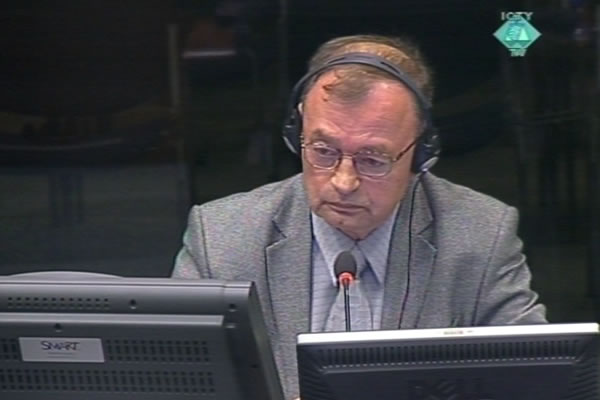Home
RADOVAN KARADZIC’S DIRECTIVES AND ‘INNERMOST WISHES’
As Manojlo Milovanovic continued his evidence, he spoke about the infamous Directive 7 and the creation of unbearable living conditions for the population in the Srebrenica enclave. He also described a meeting of the Supreme Command at which Karadzic commended the private agencies involved in the ‘export of personnel’, saying it was his ‘innermost wish’ to have as few Muslims of military age in BH as possible
 Manojlo Milanovic, witness at the Radovan Karadzic trial
Manojlo Milanovic, witness at the Radovan Karadzic trial ‘War is too serious a business for it to be run by generals’, said General Manojlo Milovanovic at the trial of the former Republika Srpska president Radovan Karadzic, as he explained how directives with the instructions for future combat tasks of the VRS came into being. As Milovanovic explained, Karadzic and other Supreme Command members were in charge of passing the directives; the Supreme Command was the military and political organ in charge of warfare.
Milovanovic confirmed that Radivoje Miletic drafted the Directive 7 of 8 March 1995, which was in turn signed by Karadzic. Although the witness claimed he didn’t know who had given Miletic his instructions, he said the procedure required for a directive to be sent to Karadzic, as the supreme commander, twice. The first time, he inspected the document, there was some discussion and final rewriting. The second time such documents were submitted to Karadzic for his signature. The Directive Seven ordered the soldiers to ‘create an unbearable situation of total insecurity, with no hope of further survival or life for the inhabitants of Srebrenica or Zepa’ in order to force them to leave the enclaves.
When Judge Baird asked the witness if this was part of a task issued by the Main Staff to the Drina Corps, Milovanovic said, ‘No, this task was given to the Drina Corps directly by the Supreme Command’. Mladic’s order of 31 March, relayed to the Drina Corps, does not contain this sentence, he added. By leaving out this sentence, Mladic took upon himself the responsibility for the failure to carry out the Supreme Command’s order because the army ‘was not there to target civilians’.
The prosecutor also noted that the Supreme Command held its 14th meeting in Pale on the same day when Mladic issued his version of the Directive 7, on 31 March 1995. According to the minutes, the Supreme Command did not debate the Directive 7, but there was discussion about the effort to move out Muslims and Croats from RS into third countries. At the meeting, Momcilo Krajisnik revealed the existence of ‘private exporters of personnel’. Those were so-called travel agencies which sold arrangements for a safe departure to a third country for 6,000 German marks per person.
As Milovanovic said, the debate made him think that Karadzic was aware of the fact that the Muslims and Croats were being ferried across the border by privately-run enterprises, that Karadzic felt it was a good thing, and that he expressed his ‘innermost wish’ to have as few Muslims of military age as possible in BH.
As he began his cross-examination, Karadzic tried to put a different spin on his own words at the meeting, but he failed because Milovanovic simply directed him to the minutes where ‘everything is clearly recorded’. It is impossible to change the substance of Karadzic’s words: the accused felt it was good for the private agencies to be involved in the effort to move out the Muslims thus precluding any state involvement.
Karadzic will continue cross-examining General Milovanovic tomorrow.
Linked Reports
- Case : Karadzic
- 2012-02-28 KARADZIC, MILOVANOVIC AND ARKAN’S ‘PRIVATE TERRORISM’
- 2012-02-28 RADOVAN KARADZIC’S SREBRENICA ‘FRENCH CONNECTION’
- 2012-02-27 DRAZEN ERDEMOVIC IN THE HAGUE FOR THE SEVENTH TIME
- 2012-03-01 ‘IGNORANT ADVISORS’ AND ‘INDESTRUCTIBLE’ MLADIC
- 2012-03-05 KARADZIC AND MILOVANOVIC SHARE ‘TRUTHS AND MISCONCEPTIONS’
- 2012-03-06 KARADZIC: SREBRENICA INVESTIGATION WAS ‘SLOPPY’
